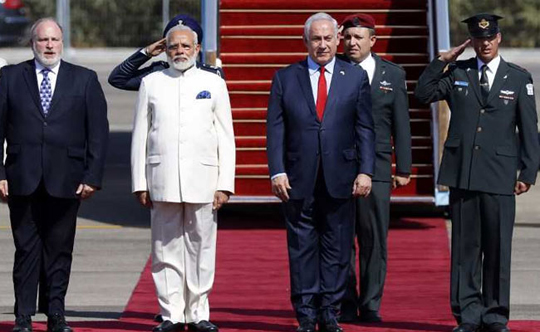Washington, Feb 23: U.S. president Donald Trump on Saturday said he was looking forward to being with his "great friends" in India next week as he retweeted a short video in which his face was superimposed on the hit movie-character Bahubali, showing the president as a great saviour bringing peace to his kingdom.
Trump will pay a state visit to India on February 24 and 25, accompanied by a high-level delegation including first lady Melania Trump, his daughter Ivanka, son-in-law Jared Kushner and a galaxy of top American officials.
"Look so forward to being with my great friends India!" Trump said in the tweet.
Along with the tweet, Trump retweeted an 81-second video by a Twitter account identified as "Sol" with the handle Solmemes1.
"To celebrate Trump's visit to India I wanted to make a video to show how in my warped mind it will go... USA and India united!" the handle Solmemes1 tweeted in the original post with the video.
Trump appears as a great saviour, in the short animated clip, riding on a chariot with Melania. A few stills later, Trump is seen riding a horse carrying on his shoulders his son Donald Jr and daughter Ivanka.
Later, he is welcomed by Narendra Modi in a village setting. Hundreds and thousands of people are seen welcoming Trump in the video.
"This week Trump will visit India and in celebration I have created a new meme for the occasion... You few, who are my patrons, get to see it first!" Sol told viewers on subscription content service Patreon on Saturday. A few hours later, Trump retweeted the video.
In the Twitter description, Sol describes herself as "award winning master memetician, professor of memology at University of GFY, my views are my own and not associated with real life."
The Trump-Bahubali video, which ends with "USA and India United", went viral after Trump retweeted it. In a few hours, it was seen by nearly 6 lakh people.
Sol in one of her previous posts, dated January 23, writes she was inspired by a video of Bahubali sent to her by a friend, which is the story of 'good defeating evil.'
This inspired Sol to create her first Bahubali-theme meme. The video, lasting 93 seconds, is titled "Jiyo Re Baahu Trump", in which the first lady is seen wearing a saree. "Jiyo Re Bahubali," is the theme song of the video.
"I just loved this video when I saw it! A friend sent it to me and he told me that it is the story of good defeating evil... it was so fitting I had to make it (meme)..." Sol wrote in her post.
Sol's posts show that she is an admirer of Trump. Sol's January 23 video was released at the peak of Trump's impeachment proceedings.
Trump is seen being greeted by an elephant, which bears the logo of the Republican Party.
Towards the end of the video, Trump is seen riding the elephant, and putting on fire the effigy of "Raavan" marked as "D" in a big circle representing the opposition Democratic Party.
An arrow is given by warrior Narendra Modi to the First Lady, who then passes it on to Trump, before he lights the effigy.







Comments
Add new comment